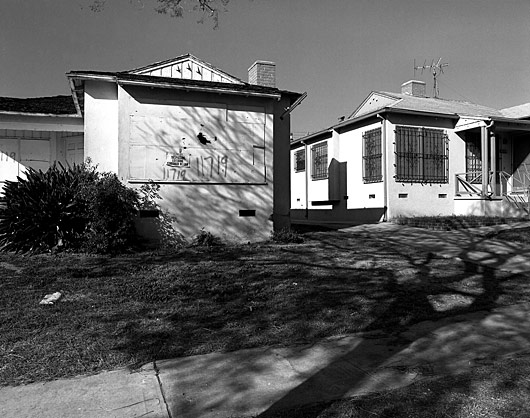
Community members shared stories of their run-ins with police earlier this month at Community Coalition.
What Police Should Be Doing For Us—Not to Us
Last week Vincent Warren, executive director of the New York-based Center for Constitutional Rights, put the practice of Stop and Frisk in perspective: Speaking to Los Angeles residents gathered at Community Coalition’s headquarters on South Vermont Avenue, he invoked the memory of Amadou Diallo, an unarmed man who, in 1999, was shot in the chest 41 times by police detectives searching for someone else.
The detectives, assigned to a unit designed to remove illegal guns from the street, were looking for a serial rapist and followed Diallo, a man with no criminal record and no involvement in the crime they were investigating, into his Bronx apartment building early in the morning for questioning. When he reached for his wallet, the officers fired their guns, likely because one of them panicked and the others followed him.
Warren’s message: There are consequences when police bend the rules, and those consequences rarely support public safety. “We want the police to be doing things for us, not to us,” he told the audience of 60, which included South LA residents, SCOPE members, and youth groups. In one year, NYPD made over 600,000 stops. Eighty seven percent of those stops involved people of color, and less than three percent of those stopped were arrested or cited. Instead, “the practice simply perpetuates the myth that black and brown folks pose a threat to public safety,” said SCOPE’s President and CEO Gloria Walton. “Without doing anything to combat the real reasons crime exists.”
Last year, a federal court ultimately ruled that the city was violating constitutional rights, and since taking office Mayor Bill de Blasio has retracted an appeal to reverse the verdict.
Unethical police tactics resonate loudly and uniquely in Los Angeles, where Stop and Frisk isn’t an admitted practice, but racial profiling is clearly rampant. The legacy of the Rodney King thrives in more recent incidents, such as the fatal beating in 2011 of Kelly Thomas, a schizophrenic homeless man who was guilty of nothing more than loitering in a parking lot. Most recently, Margie Carranza and her mother Emma Hernandez were mistakenly fired at more than 100 times by LAPD, who were on the hunt for disgruntled ex-cop Chris Dorner.
Meanwhile Assembly Bill 109, which was signed into law two years ago, allows for something called “community supervision”—those cited for non-violent, less serious offenses will be aggressively monitored in their own homes. This means police can search these people’s homes, their cars, and even their person at any time, without warrants or even just cause. “You basically have only the same rights as someone who is incarcerated even though you’re walking around free,” said Marqueece Harris-Dawson, president and CEO of Community Coalition.
Attendees shared their experiences of police mistreatment—stories about being questioned for wearing hoods, pulled off of buses, subjected to house raids—all actions that didn’t result in arrest. Many wondered why their families are forced to live in fear of intimidation when 45 percent of the city budget—their taxes—goes toward law enforcement and public safety services designed to protect them.
“It’s a systemic problem that requires all hands on desk in order to solve it,” said Warren. New York City has implemented a remedial process that includes the mayor, police commissioner, and the police union. Because even some rank and file officers have claimed to feel victimized by Stop and Frisk, as they’ve been penalized for not engaging in the practice.
But the real solution lies in ensuring that police officers are held accountable for knowing and following the law and that community members take a vigilant stance when they’re stopped on the street. Because if we don’t, equitable, humane treatment can never be enforced, said Walton.
The bottom line: It’s more than possible to have safe streets, peaceful neighborhoods—and a police department that treats folks with respect.












